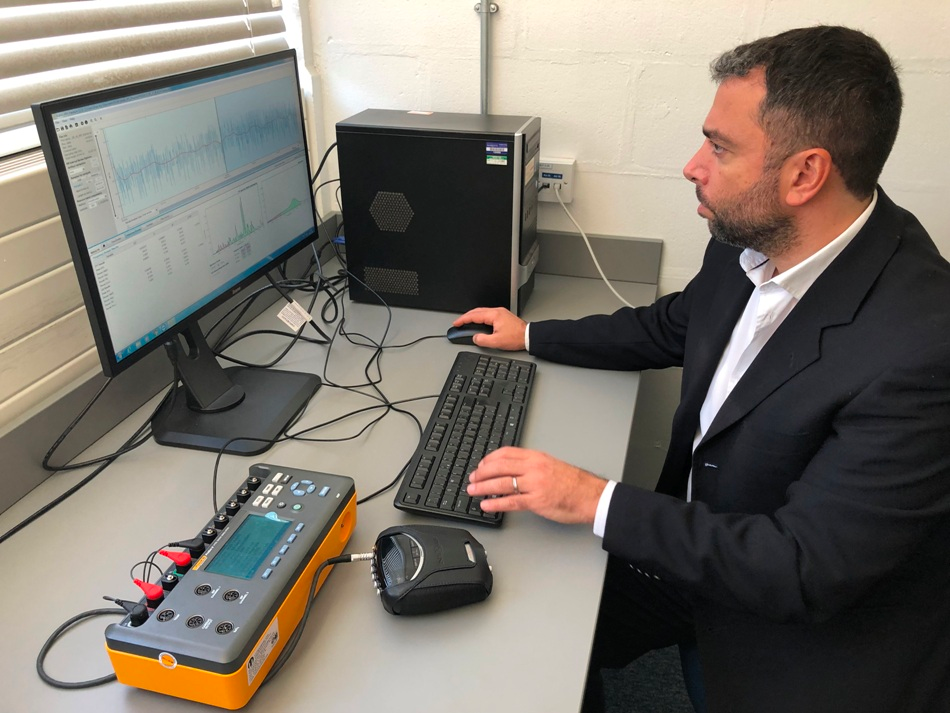Jan 14 2020
Scientists at the University of Warwick have developed a new technology that can be used to detect low glucose levels through ECG with the help of a non-invasive wearable sensor. Together with the latest artificial intelligence (AI), this technology can detect hypoglycemic events from raw ECG signals.
 Dr Leandro Pecchia with the new technology. Image Credit: University of Warwick.
Dr Leandro Pecchia with the new technology. Image Credit: University of Warwick.
At present, the NHS offers continuous glucose monitors (CGM) to detect hypoglycemia (sugar levels into blood or derma). These monitors use an invasive sensor with a small needle to measure glucose in interstitial fluid. The sensor transmits data and alarms to a display device. In several instances, calibration is required twice a day through invasive finger-prick blood glucose level tests.
But recently, a team led by Dr Leandro Pecchia, from the University of Warwick, demonstrated that using the most recent findings of AI (that is, deep learning), hypoglycemic events can be detected from raw ECG signals obtained using off-the-shelf non-invasive wearable sensors.
The study outcomes were reported in the Nature Springer journal Scientific Reports on January 13th, 2020, in a paper titled “Precision Medicine and Artificial Intelligence: A Pilot Study on Deep Learning for Hypoglycemic Events Detection based on ECG.”
Through two pilot studies with healthy volunteers, the average sensitivity and specificity was found to be roughly 82% for detecting hypoglycemia, which is almost equivalent to the existing CGM performance, though non-invasive
Fingerpicks are never pleasant and in some circumstances are particularly cumbersome. Taking fingerpick during the night certainly is unpleasant, especially for patients in paediatric age. Our innovation consisted in using artificial intelligence for automatic detecting hypoglycaemia via few ECG beats. This is relevant because ECG can be detected in any circumstance, including sleeping.
Dr Leandro Pecchia, School of Engineering, University of Warwick
The Warwick model points out the way ECG varies in each person during a hypoglycemic event. A comparison of two subjects reveals that they have different ECG waveform changes during the hypoglycemic events. Specifically, one of the subjects presents an evidently longer QT interval during a hypoglycemic event, while the other subject does not.
From the difference, a trained clinician can observe that for the first subject, the T-wave displacement has an impact on classification, indicating that when the subject experiences a hypoglycemic event, the ventricles repolarize very slowly.
The most significant components of the ECG of the second subject are the P-wave and the rising of the T-wave, reflecting that when this subject experiences a hypoglycemic event, the threshold for ventricular activation and the depolarization of the atria are specifically affected. This could have an impact on subsequent clinical interventions.
This result is feasible since the Warwick AI model has been trained using the own data of each subject. Since intersubjective variations are highly significant, training the system using cohort data would not lead to the same results. Similarly, personalized therapy based on the new system could be more effective when compared to existing methods.
The differences highlighted above could explain why previous studies using ECG to detect hypoglycaemic events failed. The performance of AI algorithms trained over cohort ECG-data would be hindered by these inter-subject differences.
Dr Leandro Pecchia, School of Engineering, University of Warwick
Dr Pecchia added, “Our approach enable personalised tuning of detection algorithms and emphasize how hypoglycaemic events affect ECG in individuals. Basing on this information, clinicians can adapt the therapy to each individual. Clearly more clinical research is required to confirm these results in wider populations. This is why we are looking for partners.”